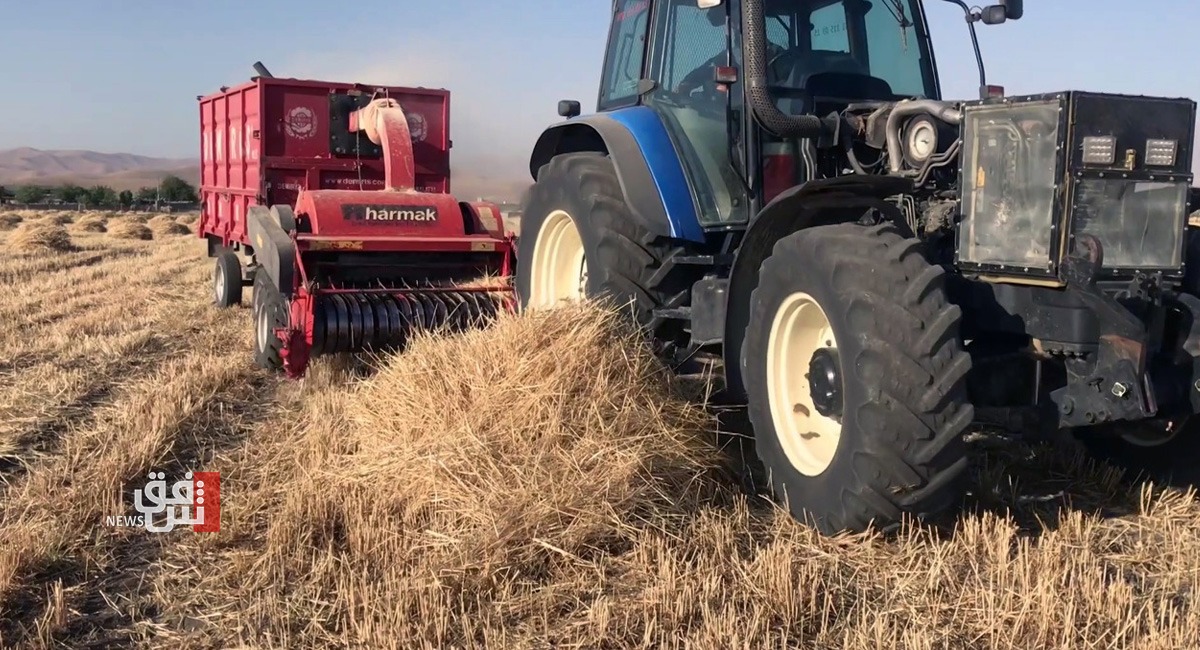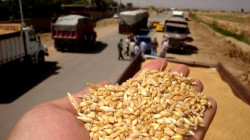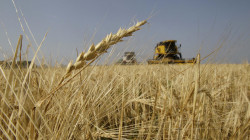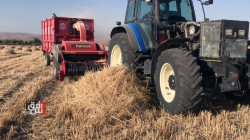Home-grown wheat won't suffice..Iraq needs to import 200,000 tons this year

Shafaq News / The Iraqi Ministry of Trade has set an official price of 750,000 dinars for a single ton of locally grown wheat crops to encourage farmers to market their crops through the ministry's official outlets.
The ministry was heavily reliant on the House of Representatives passing the food security bill because it guarantees financial allocations, securing the country's strategic wheat treasury.
The agricultural Plan
According to Haidar Nuri Jabr, deputy general manager of the General Grain Trading Company, the large quantities achieved during each wheat marketing season usually meet the country's needs for an entire year.
"We used to be self-sufficient, particularly in the last three years. However, the Ministry of Agriculture-approved plan, which required farmers to grow 50% of their agricultural areas, was not implemented due to the lack of water resources and rain, which caused a significant decrease in agricultural production, particularly the wheat crop."
Jabr continued, "This necessitated immediate government action to ensure local crop marketing, where 750,000 dinars per ton ($500) of the wheat crop was calculated without regard to quality, except for high-impurity crops valued at 725,000 dinars, a slight decrease from previous years. Even though those amounts are delivered directly, and without delay, the crop cost is delivered a year after it is marketed."
Filling the flour deficit
"In previous years, the price of wheat crops has not exceeded 500,000 dinars, but now, the measures adopted are aimed at marketing the crop locally rather than abroad," he said, adding that "the ministry's marketing outlets have received 50,000 tons per day since the beginning of the marketing season early last month, which means that the total crop marketed within nine days provides what fills the country's need for a month."
"The total quantity of wheat received from farmers within 25 days amounted to more than 460,000 tons. Those quantities are directly converted to milling to equip the Iraqi market and the company's stores and warehouses with flour to meet the food basket need.
"The total local crop will reach two million tons of wheat for four months, from April to September," said Jabr, "This means there is a need for financial support that will enhance the ministry's efforts to import wheat to meet the country's need for the following months."
"According to the lowest estimates, the ministry requires nearly three million tons of imported wheat to secure to accommodate for the consumption level in the coming months, i.e., until the next harvest," he added, urging the Ministry of Finance to increase special allocations to begin importing this crop.
Wasit is in the lead
"We expect a sharp decline in the harvest in Nineveh, due to the lack of rain, as its production last year reached nearly 65,000 tons, while two years ago it produced more than one million tons due to abundant water," he said, pointing out that Wasit leads the wheat crop producing governorates, followed by Saladin governorate.
Food Security Act
"The Grain Company relies heavily on the food security bill, and if it passes, it will guarantee the company financial allocations that will enable it to import wheat, which constitutes a revolving safe that provides the food basket and ration card with what it needs, thereby avoiding food crises," the government official said, adding that the company's and the ministry's warehouses can store quantities of more than five million tons.
Black Market
"Some powerful actors are attempting to buy wheat crops at prices higher than the official state prices, to create street tension after promoting food crises that could hit the country due to a lack of strategic wheat treasury," a government source told Shafaq News Agency.
"The price per ton has reached more than 800,000 dinars in the black market, provided that the farmer transports his crop near the border so it can be easily transported, receiving huge sums of money in the process."
"The government is taking several measures to avoid the wheat crisis, including intensifying diplomatic efforts with upstream countries to increase water releases in proportion to the country's actual need, and implementing strategic plans to build new dams with good storage capabilities to invest in rainy seasons or floods. Otherwise we will be vulnerable to severe food crises."
Strengthening strategic treasury
"Iraq needs intensive efforts to boost enough wheat imports for the next six months," said Riyadh al-Massoudi, former MP and geography professor at Karbala University. "This includes allocating funds that guarantee contracting with wheat-exporting countries and thus strengthening the country's strategic treasury, i.e., importing at least three million tons sufficient for ration card needs."
Speaking to Shafaq News Agency, al-Massoudi emphasized the need for 2.5 million tons per year, 200,000 tons of which will be imported to meet the needs of the private sector or commercial market (bakeries and pastry factories), typically imported from Turkey or Iran."





